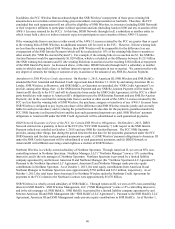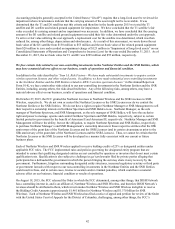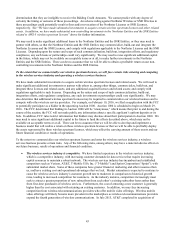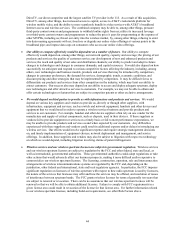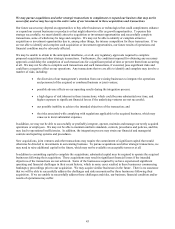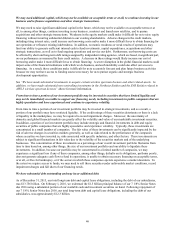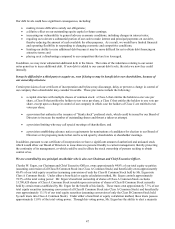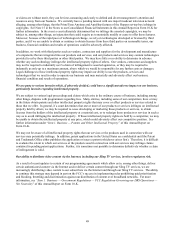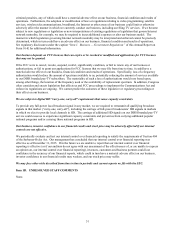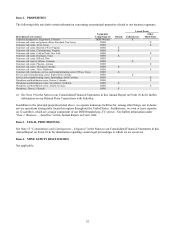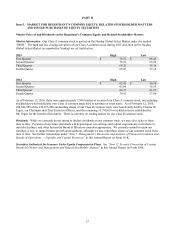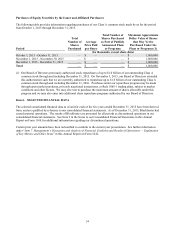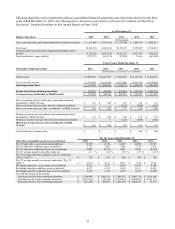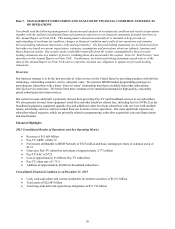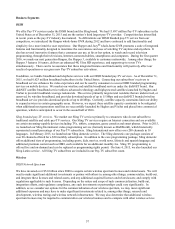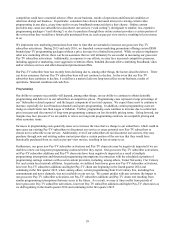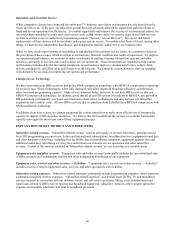Dish Network 2015 Annual Report Download - page 60
Download and view the complete annual report
Please find page 60 of the 2015 Dish Network annual report below. You can navigate through the pages in the report by either clicking on the pages listed below, or by using the keyword search tool below to find specific information within the annual report.50
Changes in the Cable Act, and/or the rules of the FCC that implement the Cable Act, may limit our ability to access
programming from cable-affiliated programmers at nondiscriminatory rates.
We purchase a large percentage of our programming from cable-affiliated programmers. Pursuant to the Cable Act,
cable providers had been prohibited from entering into exclusive contracts with cable-affiliated programmers. The Cable
Act directed that this prohibition expire after a certain period of time unless the FCC determined that the prohibition
continued to be necessary. On October 5, 2012, the FCC allowed this prohibition to expire. While the FCC has issued a
Further Notice of Proposed Rulemaking aimed at serving some of the same objectives as the prohibition, there can be no
assurances that such protections will be adopted or be as effective as the prohibition if they are adopted. In the event this
decision is reconsidered by the FCC or reviewed by a court of appeals, we cannot predict the timing or outcome of any
subsequent FCC decision.
As a result of the expiration of this prohibition on exclusivity, we may be limited in our ability to obtain access at all, or
on nondiscriminatory terms, to programming from programmers that are affiliated with cable system operators. In
addition, any other changes in the Cable Act, and/or the FCC’s rules that implement the Cable Act, that currently limit
the ability of cable-affiliated programmers to discriminate against competing businesses such as ours, could adversely
affect our ability to acquire cable-affiliated programming at all or to acquire programming on nondiscriminatory terms.
Furthermore, the FCC had imposed program access conditions on certain cable companies as a result of mergers,
consolidations or affiliations with programmers. The expiration of the exclusivity prohibition in the Cable Act triggered
the termination of certain program access conditions that the FCC had imposed on Liberty. In July 2012, similar
program access conditions that had applied to Time Warner Cable expired as previously scheduled. These developments
may adversely affect our ability to obtain Liberty’s and Time Warner Cable’s programming, or to obtain it on
nondiscriminatory terms. In the case of certain types of programming affiliated with Comcast through its control of
NBCUniversal, the prohibition on exclusivity will still apply until January 2018. During that time, we have the right to
subject the terms of access to NBCUniversal’s programming to binding arbitration if we and the programmer cannot
reach agreement on terms, subject to FCC review. There can be no assurance that this procedure will result in favorable
terms for us.
In addition, affiliates of certain cable providers have denied us access to sports programming that they distribute to their
cable systems terrestrially, rather than by satellite. The FCC has held that new denials of such service are unfair if they
have the purpose or effect of significantly hindering us from providing programming to consumers. However, we cannot
be certain that we can prevail in a complaint related to such programming and gain access to it. Our continuing failure to
access such programming could materially and adversely affect our ability to compete in regions serviced by these cable
providers.
The injunction against our retransmission of distant networks, which is currently waived, may be reinstated.
Pursuant to STELA, we obtained a waiver of a court injunction that previously prevented us from retransmitting certain
distant network signals under a statutory copyright license. Because of that waiver, we may provide distant network
signals to eligible subscribers. To qualify for that waiver, we are required to provide local service in all 210 local
markets in the U.S. on an ongoing basis. This condition poses a significant strain on our capacity. Moreover, we may
lose that waiver if we are found to have failed to provide local service in any of the 210 local markets. If we lose the
waiver, the injunction could be reinstated. Furthermore, depending on the severity of the failure, we may also be subject
to other sanctions, which may include, among other things, damages.
We are subject to significant regulatory oversight, and changes in applicable regulatory requirements, including any
adoption or modification of laws or regulations relating to the Internet, could adversely affect our business.
Our operations, particularly our DBS operations and our wireless spectrum licenses, are subject to significant
government regulation and oversight, primarily by the FCC and, to a certain extent, by Congress, other federal agencies
and foreign, state and local authorities. Depending upon the circumstances, noncompliance with legislation or
regulations promulgated by these authorities could result in the limitations on, or suspension or revocation of, our
licenses or registrations, the termination or loss of contracts or the imposition of contractual damages, civil fines or


